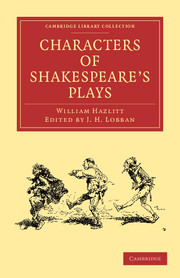Book contents
- Frontmatter
- Preface
- Contents
- Introduction
- Preface
- Cymbeline
- Macbeth
- Julius Cæsar
- Othello
- Timon of Athens
- Coriolanus
- Troilus and Cressida
- Antony and Cleopatra
- Hamlet
- The Tempest
- The Midsummer Night's Dream
- Romeo and Juliet
- Lear
- Richard II
- Henry IV
- Henry V
- Henry VI
- Richard III
- Henry VIII
- King John
- Twelfth Night; or, what you will
- The Two Gentlemen of Verona
- The Merchant of Venice
- The Winter's Tale
- All's Well That Ends Well
- Love's Labour's Lost
- Much Ado About Nothing
- As You Like It
- The Taming of the Shrew
- Measure for Measure
- The Merry Wives of Windsor
- The Comedy of Errors
- Doubtful plays of Shakespear
- Poems and Sonnets
- Notes
Coriolanus
Published online by Cambridge University Press: 07 September 2010
- Frontmatter
- Preface
- Contents
- Introduction
- Preface
- Cymbeline
- Macbeth
- Julius Cæsar
- Othello
- Timon of Athens
- Coriolanus
- Troilus and Cressida
- Antony and Cleopatra
- Hamlet
- The Tempest
- The Midsummer Night's Dream
- Romeo and Juliet
- Lear
- Richard II
- Henry IV
- Henry V
- Henry VI
- Richard III
- Henry VIII
- King John
- Twelfth Night; or, what you will
- The Two Gentlemen of Verona
- The Merchant of Venice
- The Winter's Tale
- All's Well That Ends Well
- Love's Labour's Lost
- Much Ado About Nothing
- As You Like It
- The Taming of the Shrew
- Measure for Measure
- The Merry Wives of Windsor
- The Comedy of Errors
- Doubtful plays of Shakespear
- Poems and Sonnets
- Notes
Summary
Shakespear has in this play shewn himself well versed in history and state-affairs. Coriolanus is a storehouse of political commonplaces. Any one who studies it may save himself the trouble of reading Burke's Reflections, or Paine's Rights of Man, or the Debates in both Houses of Parliament since the French Revolution or our own. The arguments for and against aristocracy or democracy, on the privileges of the few and the claims of the many, on liberty and slavery, power and the abuse of it, peace and war, are here very ably handled, with the spirit of a poet and the acuteness of a philosopher. Shakespear himself seems to have had a leaning to the arbitrary side of the question, perhaps from some feeling of contempt for his own origin; and to have spared no occasion of bating the rabble. What he says of them is very true: what he says of their betters is also very true, though he dwells less upon it. –The cause of the people is indeed but little calculated as a subject for poetry: it admits of rhetoric, which goes into argument and explanation, but it presents no immediate or distinct images to the mind, “no jutting frieze, buttress, or coigne of vantage” for poetry “to make its pendant bed and procreant cradle in.” The language of poetry naturally falls in with the language of power.
- Type
- Chapter
- Information
- Characters of Shakespeare's Plays , pp. 59 - 68Publisher: Cambridge University PressPrint publication year: 2009First published in: 1908

